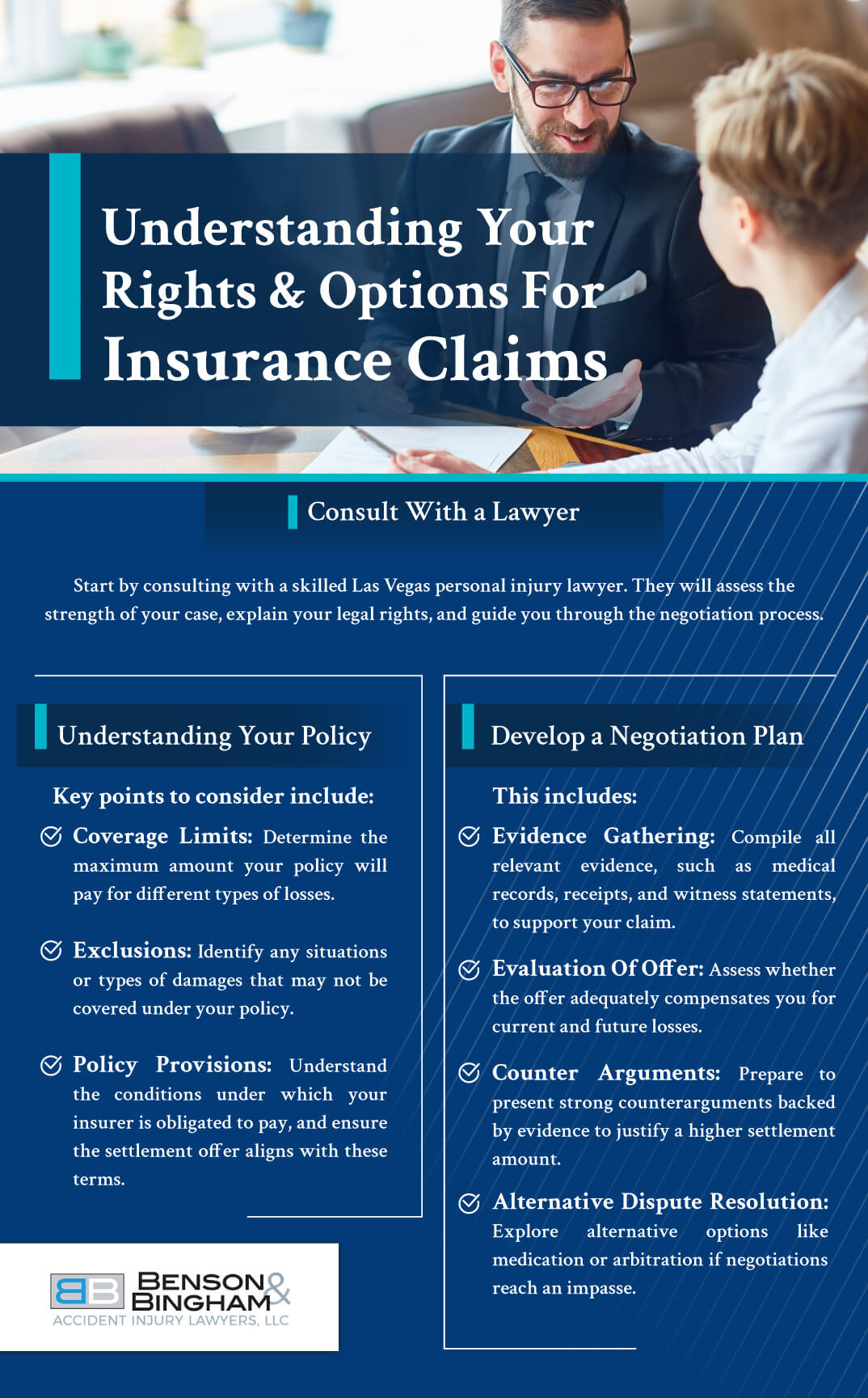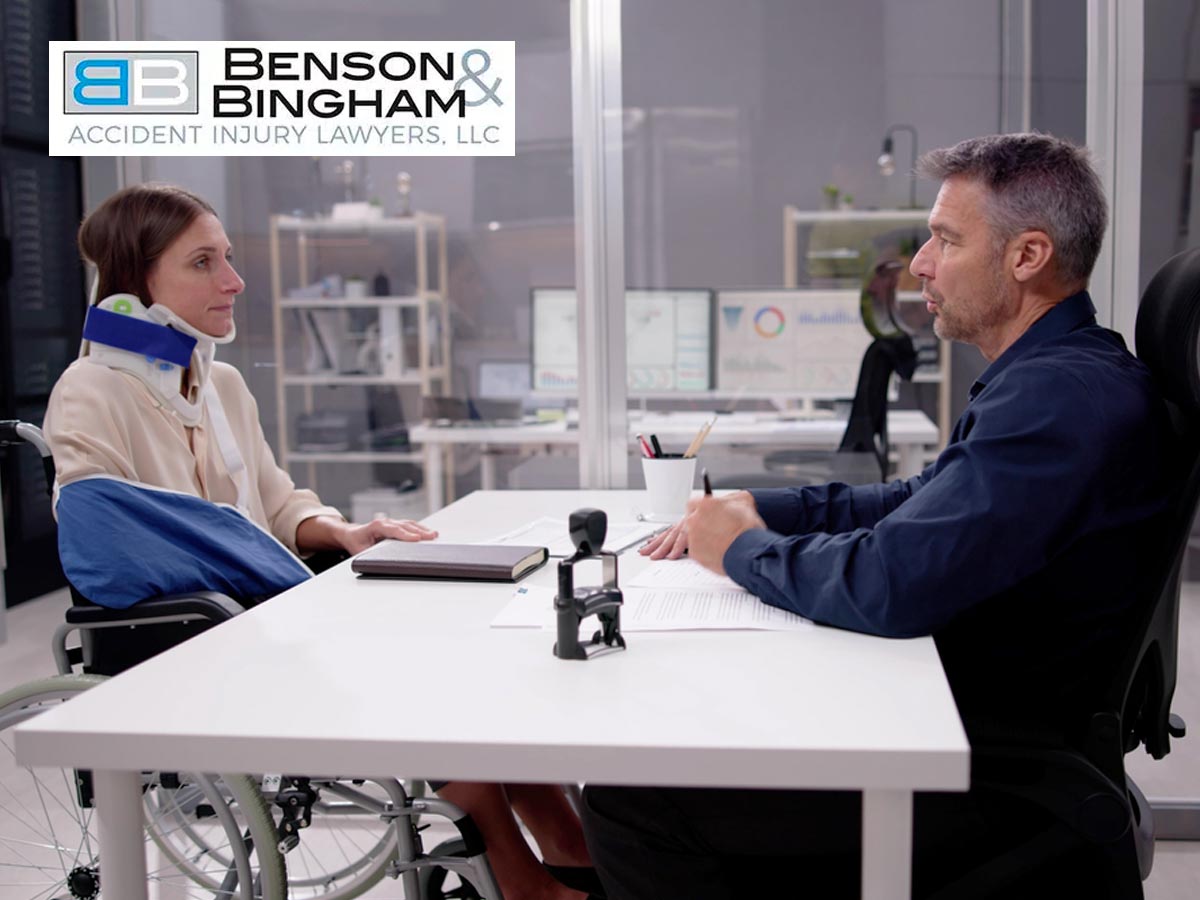Assessing Insurance Settlement Offers For Adequate Compensation In Las Vegas: Key Factors & Strategies

A Las Vegas personal injury lawyer can be a huge asset in determining if your settlement is the appropriate amount. They can negotiate on your behalf to raise the amount or help you understand if the amount is right for you based on your circumstances.
Making Informed Decisions: Accepting Or Negotiating Insurance Settlements
Careful evaluation of whether the offer adequately compensates you for your losses and aligns with your legal rights is necessary before making a decision to settle or negotiate. If the settlement offer fairly compensates you for all damages and meets your immediate needs, accepting might be appropriate.
Negotiating For a Better Offer
If the initial offer seems inadequate or fails to fully compensate you for your losses, consider negotiating further. Here’s how to proceed:
- Present Evidence: Provide additional documentation and evidence to support your claim for a higher settlement amount.
- Counteroffer: Propose a counteroffer that reflects a more accurate assessment of your damages and losses.
- Legal Guidance: Rely on your lawyer’s expertise to navigate negotiations effectively, ensuring your arguments are strong and well-supported.
If negotiations do not result in a fair settlement offer, litigation may be necessary to pursue your claim fully.
Ultimately, the decision to accept, negotiate, or pursue litigation should be based on a thorough assessment of your damages, legal rights, and the practical considerations of achieving fair compensation. Your Las Vegas personal injury lawyer’s guidance and expertise will be instrumental in navigating these decisions and ensuring your interests are protected throughout the settlement process.
How To Evaluate An Insurance Settlement Offer Thoroughly
-
When reviewing the details of a settlement offer, it’s crucial to delve into the specifics provided by the insurance company. Carefully examine the proposed amount and any conditions attached to the offer. Compare this offer with the actual damages and losses you’ve incurred due to the incident. Ensure that the offer adequately covers:
- Medical Expenses: Include all past medical bills related to injuries sustained.
- Lost Income: Consider any wages or income lost due to inability to work.
- Property Damage: Evaluate repair or replacement costs for damaged property.
- Other Economic Losses: Factor in additional expenses like transportation costs or home modifications necessitated by injuries.
- Coverage Limits: Determine the maximum amount your policy will pay for different types of losses.
- Exclusions: Identify any situations or types of damages that may not be covered under your policy.
- Policy Provisions: Understand the conditions under which your insurer is obligated to pay, and ensure the settlement offer aligns with these terms.
- Evidence Gathering: Compile all relevant evidence, such as medical records, receipts, and witness statements, to support your claim.
- Evaluation Of Offer: Assess whether the offer adequately compensates you for current and future losses.
- Counter Arguments: Prepare to present strong counterarguments backed by evidence to justify a higher settlement amount.
- Alternative Dispute Resolution: Explore alternative options like medication or arbitration if negotiations reach an impasse.
Consider not just current but also potential future costs related to ongoing medical treatments, rehabilitation, and any long-term effects of injuries that may impact your ability to work or require continued care. Seek advice from a Las Vegas personal injury lawyer to assess the fairness and adequacy of the offer in light of these factors, ensuring that all aspects of your losses are comprehensively addressed.
Understanding Your Rights & Options For Insurance Claims
Knowing when to settle and when to ask for more in an insurance claim requires a deep understanding of your rights and options, supported by legal guidance, policy comprehension, and a well-developed negotiation strategy.
Consult With a Lawyer
Start by consulting with a skilled Las Vegas personal injury lawyer. They will assess the strength of your case, explain your legal rights, and guide you through the negotiation process. Your lawyer’s insights and expertise will be invaluable in determining whether the settlement offer adequately compensates you for your damages.
Understanding Your Policy
Thoroughly review your insurance policy to understand the extent of your coverage and any limitations or exclusions that may affect your claim. Key points to consider include:
Develop a Negotiation Plan
Lastly, work closely with your attorney to develop a strategic approach to negotiations. This includes:

Get In Touch With Our Top-Rated Lawyers For Help With Your Settlement

Our Las Vegas Injury Lawyers at Benson & Bingham specializes in negotiating fair and comprehensive settlements for clients across various legal areas, including personal injury, insurance claims, and more. We are dedicated to maximizing your compensation by leveraging our extensive experience and legal expertise.
Contact us today to schedule a consultation and start pursuing the settlement you deserve.
Read About Our Other Secret Top Tips to Maximize Your Compensation
1. Settle Faster, Settle Bigger: 20 Tips From Top Injury Lawyers for Maximizing Your Settlement
2. Understanding the Insurance Process: Navigating insurance claims and negotiations effectively.
3. Gathering Crucial Evidence: Tips for collecting and preserving evidence to strengthen your case.
4. Documenting Your Injuries: Importance of thorough medical documentation for maximizing compensation.
5. Negotiating with Insurance Adjusters: Techniques for achieving a favorable settlement offer.
6. Understanding Settlement Offers: Evaluating offers and knowing when to accept or negotiate further.
7. Considering Future Damages: Anticipating long-term medical expenses and future losses.
8. Avoiding Common Mistakes: Pitfalls to avoid that could jeopardize your settlement.
9. Calculating Your Damages: Including medical bills, lost wages, and non-economic damages.
10. Proving Liability: Strategies for establishing fault and holding the responsible party accountable.
11. Dealing with Medical Providers: Managing medical bills and liens during the settlement process.
12. Utilizing Expert Testimony: Leveraging expert witnesses to support your claim.
13.Navigating Legal Deadlines: Understanding statutes of limitations and other time constraints.
14. Preparing for Litigation: Steps to take if settlement negotiations break down and litigation becomes necessary.
15. Seeking Emotional Support: Importance of seeking emotional support during the settlement process.
16. Reviewing Legal Fees and Costs: Understanding the financial aspects of hiring a lawyer and pursuing a claim.
17. Handling Subrogation Claims: Dealing with reimbursement claims from insurance providers.
18. Staying Informed and Empowered: Keeping up-to-date with the progress of your case and asking questions.
19. Protecting Your Rights: Knowing your legal rights and advocating for fair treatment throughout the process.
20. Maintaining Confidentiality in Settlement Negotiations and Mediations


